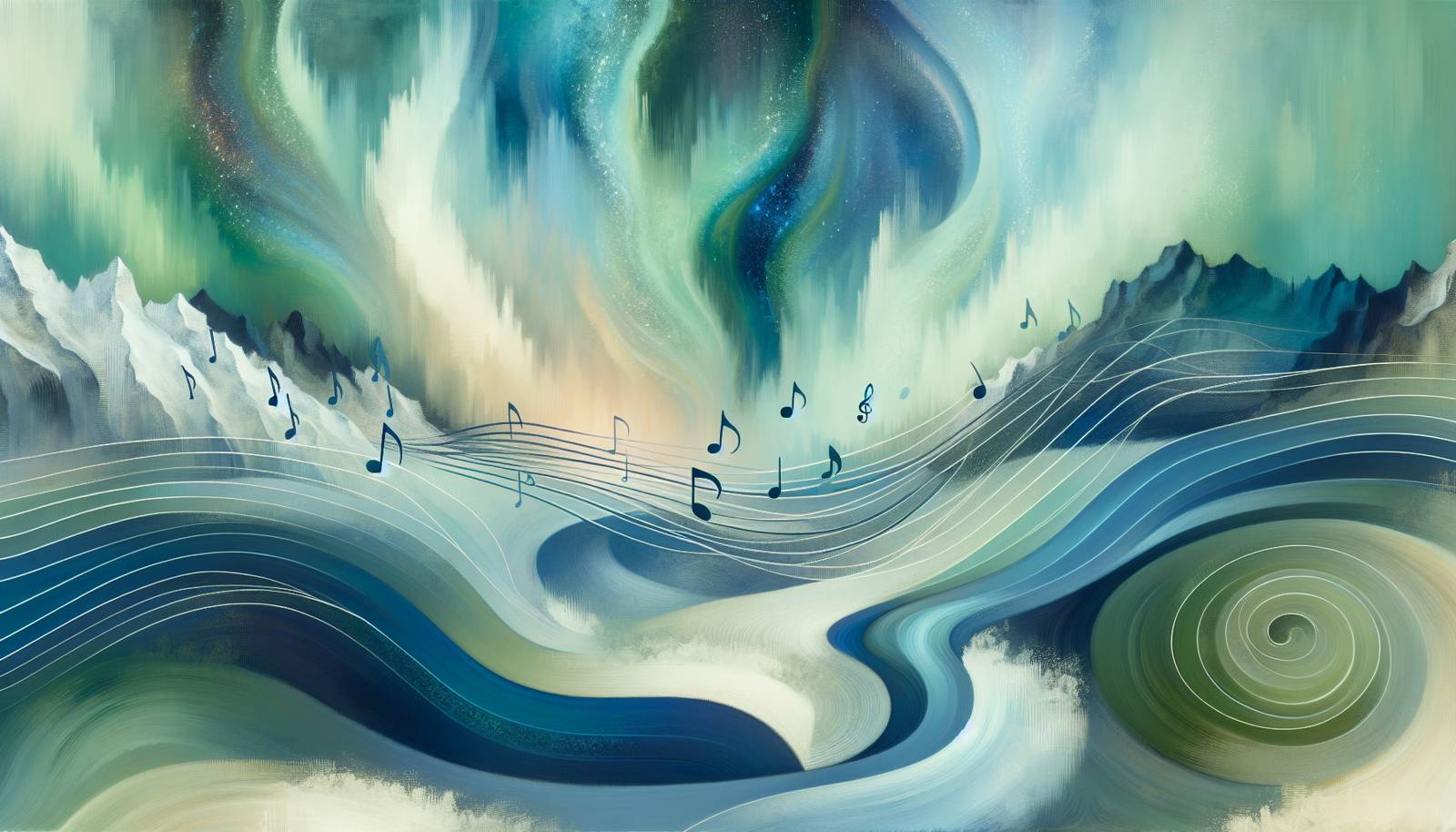
FAQ About The Influence of Icelandic Music on Global Sounds

What makes Icelandic music unique?
Icelandic music is distinctive due to its blend of traditional folk influences and contemporary genres. The use of native language, unique vocal techniques, and traditional instruments like the langspil contribute to its uniqueness. Modern Icelandic artists often incorporate natural landscapes into their music, which adds a mythic and ethereal quality that sets it apart on the global stage.

How has Björk influenced global music?
Björk, one of Iceland's most renowned musicians, has had a significant impact on global music with her innovative approach to combining electronic, pop, classical, and avant-garde elements. Her experimental style and incorporation of bold visual aesthetics have inspired countless artists across various genres. Björk's influence extends beyond music into fashion and technology, making her a leading figure in contemporary art culture.

What role does Icelandic folk music play in international music scenes?
Icelandic folk music, characterized by its melodic and lyrical nature, has had a profound influence on the international music scene. Elements of Icelandic folklore, including storytelling and the use of traditional instruments, have been integrated into various global music genres. This has enriched world music by adding a mystical and mythical dimension, often visible in film scores and world fusion projects.

Which Icelandic artist has contributed to film scores internationally?
Ólafur Arnalds and Jóhann Jóhannsson are two Icelandic artists known for their contributions to international film scores. Ólafur Arnalds blends classical music with electronic elements, creating emotionally impactful scores for films and TV series like 'Broadchurch.' Jóhann Jóhannsson, who composed for films like 'Sicario' and 'The Theory of Everything,' is celebrated for his minimalist and atmospheric compositions.

How has Sigur Rós influenced international music?
Sigur Rós has had a significant impact on international music by popularizing post-rock with their ethereal soundscapes and haunting vocals. Their innovative use of language, often singing in a made-up language known as "Hopelandic," and their emotionally evocative compositions have inspired many other artists and bands across the world. Their influence can be seen in genres ranging from ambient music to indie rock.

What impact has Iceland Airwaves festival had on international music?
The Iceland Airwaves festival has played a crucial role in highlighting Icelandic music on the world stage by bringing international audiences to Reykjavik. It has become a hub for discovering new talent, offering Icelandic musicians an opportunity to perform alongside international acts. This exposure has enabled the blending of Icelandic and global music scenes, fostering collaboration and exchange.

Are there specific instruments associated with Icelandic music that have influenced global sounds?
Yes, traditional Icelandic instruments such as the langspil and the Icelandic harp have influenced global music by adding distinct sounds and textures to compositions. These instruments have been utilized by both Icelandic and international musicians to evoke the unique atmosphere associated with Iceland's cultural and natural heritage.

How do Icelandic music themes reflect the country's culture?
Icelandic music often reflects the country’s culture through themes of nature, mythology, and folklore. Many Icelandic songs draw inspiration from the rugged landscapes, volcanic activity, and harsh weather, creating a powerful sense of place. These themes contribute to its unique sound and provide international audiences insight into Icelandic culture and heritage.

Has contemporary Icelandic pop music influenced global music trends?
Contemporary Icelandic pop music has made a considerable impact on global music trends by combining catchy melodies with creative production techniques. Artists like Of Monsters and Men gained international fame with their hit 'Little Talks,' showcasing an indie-pop sound that has resonated worldwide and influenced the indie music scene globally with its harmonious richness and narrative style.

What is the significance of the Icelandic music scene for local artists?
The Icelandic music scene is of great importance to local artists as it serves as both an incubator and a platform for creative expression. The close-knit community, coupled with local support, allows musicians to experiment with various genres and styles without significant commercial pressure. This environment fosters innovation and a high level of artistic output that gains recognition beyond Iceland's borders.

How do international musicians collaborate with Icelandic artists?
International musicians often collaborate with Icelandic artists through festivals like Iceland Airwaves, as well as through online platforms and projects that focus on cultural exchange. These collaborations expand the creative horizons for both parties and introduce unique sounds and ideas, further enriching global music culture.

What makes Iceland an attractive location for music festivals?
Iceland is an attractive location for music festivals due to its stunning natural landscapes, vibrant cultural scene, and the unique blend of tradition and modernity. Festivals such as Iceland Airwaves offer artists and attendees a distinct experience, combining live music with the captivating backdrop of Iceland's geography, making it a memorable setting for both performances and tourism.

Are there any notable Icelandic musical collaborations with international artists?
Yes, there are several notable collaborations between Icelandic musicians and international artists. Björk's work with global musicians, including Antony Hegarty and Arca, exemplifies this. Additionally, Sigur Rós's involvement with artists like Radiohead reflects the ongoing exchange between Icelandic musicians and the broader global music community, contributing significantly to the richness of contemporary music.

How has Iceland's geography influenced its music?
Iceland's geography has a profound influence on its music, often serving as a source of inspiration for artists. The dramatic landscapes of glaciers, volcanoes, and vast wilderness manifest in the ethereal and atmospheric sounds typical of Icelandic music. This connection to geography is reflected in the music's ability to convey a sense of space and emotional depth.

Are there specific genres of music in Iceland that have gained global popularity?
Yes, genres such as post-rock and ambient music from Iceland have gained global popularity, primarily through bands like Sigur Rós and solo artists like Ólafur Arnalds. Their distinctive soundscapes, which often incorporate elements of Icelandic folk music, have captured international audiences, contributing significantly to these genres' evolution and appreciation worldwide.

How do traditional Icelandic music and modern genres coexist?
Traditional Icelandic music and modern genres coexist harmoniously, with many artists blending elements from both to create innovative sounds. This fusion is achieved by combining traditional instruments and melodies with modern electronic or pop elements, allowing Icelandic music to maintain its cultural roots while evolving within a contemporary framework that appeals globally.

What challenges do Icelandic musicians face in gaining international recognition?
Icelandic musicians often face challenges such as geographical isolation, limited local market size, and language barriers when seeking international recognition. However, the unique qualities of Icelandic music often transcend these challenges, aided by international festivals, the internet, and collaborations that help bring their music to a wider audience.

How is Icelandic music preserved and promoted internationally?
Icelandic music is preserved and promoted internationally through various means, such as music festivals, cultural exchanges, and digital platforms. Icelandic record labels and artists leverage online distribution channels to reach global audiences, while institutions like the Arni Magnússon Institute for Icelandic Studies play a key role in preserving traditional music and its cultural heritage.

What role does the Icelandic government play in supporting music exports?
The Icelandic government supports music exports through initiatives like the Iceland Music Export (IMX) office, which helps promote Icelandic music abroad. These efforts include providing funding, facilitating international collaborations, and organizing overseas tours for Icelandic artists, helping to increase their visibility on the global stage.

What future trends can be expected in the Icelandic music scene?
The future of the Icelandic music scene looks promising, with continued innovation expected as artists experiment with new genres and technologies. Increased international collaboration and digital access will likely continue broadening its global influence. Continuous blending of traditional elements with modern sounds is expected to further define and diversify Iceland's contribution to the global music landscape.
